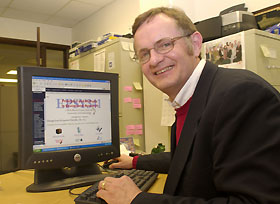For more archives, go to the Advance Archive/Search Page.
Online Master's In Gifted Ed
Serves Students Around The World
One student asked a classmate about a reading assignment. Another asked the professor for feedback on a paper. Several discussed a group project.

|
|
Del Siegle, an associate professor of educational psychology, heads an online master's degree program in gifted education that is
offered to students worldwide.
Photo by Melissa Arbo
|
It sounds like ordinary classroom conversation, but there's a twist: The students live in Alaska, Singapore, and New York - and their teacher lives in Montana.
These students are among the growing number of people from around the world enrolled in UConn's online master's degree program in gifted and talented education.
There are currently 42 students in the program.
The program started two years ago when demand grew for more online courses, says Del Siegle, associate professor of educational psychology. "It's perfect for people who want to pursue an advanced degree in gifted and talented education without sacrificing family or work time," he says. And there are other benefits.
"We don't have some of the campus restrictions," he says. "We have experts in the field from around the world who give guest lectures - and our students can ask them questions."
Siegle says the courses are very interactive. "We've designed them to stimulate discussions among students and instructors and have included group projects."
He says that because students tend to participate more in discussions in online courses, learning becomes an even richer experience. "They can't hide when they're online," he says. "In a traditional class, a person can sit in the back of the room and not say a word. When they're online, if someone says, 'Bob, what do you think?' Bob has to be there."
The program is run through WebCT, an online course management software package.
In addition to the online courses, students are required to come to Storrs twice: once at the start of the program, when they meet fellow classmates and professors, and again at the end, to take the comprehensive exams. The degree program also includes attending Confratute, a professional development conference and institute held in Storrs during the summer for teachers of the gifted and talented.
Alicja Komar, who lives in Burlington, works part-time as a computer consultant.
"I love taking online classes," says Komar, the mother of two gifted children. "It's so convenient. I'm able to fit the coursework into my available time, and am not held to a daily schedule. I would never have been able to accomplish this on campus."
Teresa Hedges, a full-time teacher who lives in Kodiak, Alaska, says, "it is the only realistic way for me to take courses at this time. I don't have to take a leave of absence, I don't have to relocate, and I can do most of the work on my own schedule."
Hedges, who learned about the program through Confratute, says she "wanted to be part of the UConn program. The people and the knowledge base don't get any better."
Mireille Leong is a student who lives between two countries - Singapore and China. "I was searching for an online course that allowed me to do everything," says Leong, who was a full-time tax attorney when she started the program.
"There are many benefits of studying online," Leong says. "I could sit anywhere in an airport, Internet café, wireless hot spot, and just check in," she says. "I was able to fit the course around my schedule and still fulfill my main purpose of changing careers." She expects to graduate this summer.
Leong says she learned a lot from her classmates, many of whom had prior experience in gifted education. "Because we could not physically speak with each other, it demanded that input for any topic or discussion be written in detail," she says. "This was a major benefit of the course for me as a neophyte educator. I doubt that such sharing would have been available if we had attended class on site."
Joy Erickson works full-time as UConn's outreach director of chemistry and coordinator for the Louis Stokes Alliance for Minority Participation. A research chemist for 18 years, she was drawn to the online master's program "because of the nature of the courses," she says. "It lets you have practicum credit for doing your own creative work, and it has a component where you actually get to meet your fellow students and instructors in the summer. No other program had that."

